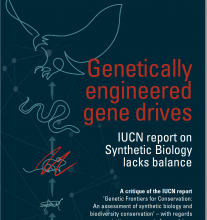A critique of the IUCN report ‘Genetic Frontiers for Conservation: An assessment of synthetic biology and biodiversity conservation’ – with regards to its assessment of gene drives

Ecosystems and biodiversity are declining rapidly; this is a global emergency that requires concerted and well-planned responses. Action is urgently needed, yet it is essential to avoid poor decisions and the tendency to grasp at flawed quick-fixes. The IUCN’s1 assessment report ‘Genetic Frontiers for Conservation’2 is meant to consider the biodiversity implications of a range of genetic engineering technologies put forward as solutions to pressing problems in areas such as biodiversity conservation and human health. Unfortunately this report fails to provide the necessary scrutiny in its assessment of these technologies.
In this critique, we focus solely on the IUCN report’s discussion of engineered gene drive organisms, a technology suggested as a new way to manage or eradicate problem species. We find that the report downplays the many risks and uncertainties surrounding gene drive technology, and possible ‘unintended consequences’ are not explored in any depth. Far more attention should have been given to the gaps in knowledge concerning this new technology and the fact that the risks inherent in altering the evolution of entire species are neither fully understood nor manageable. It is also of concern that the IUCN report actually side-lines and even tries to redefine the precautionary principle, in a manner that markedly weakens it.
Published by: Critical Scientists Switzerland (CSS), European Network of Scientists for Social and Environmental Responsibility (ENSSER), & Vereinigung Deutscher Wissenschaftler (VDW/FGS)
